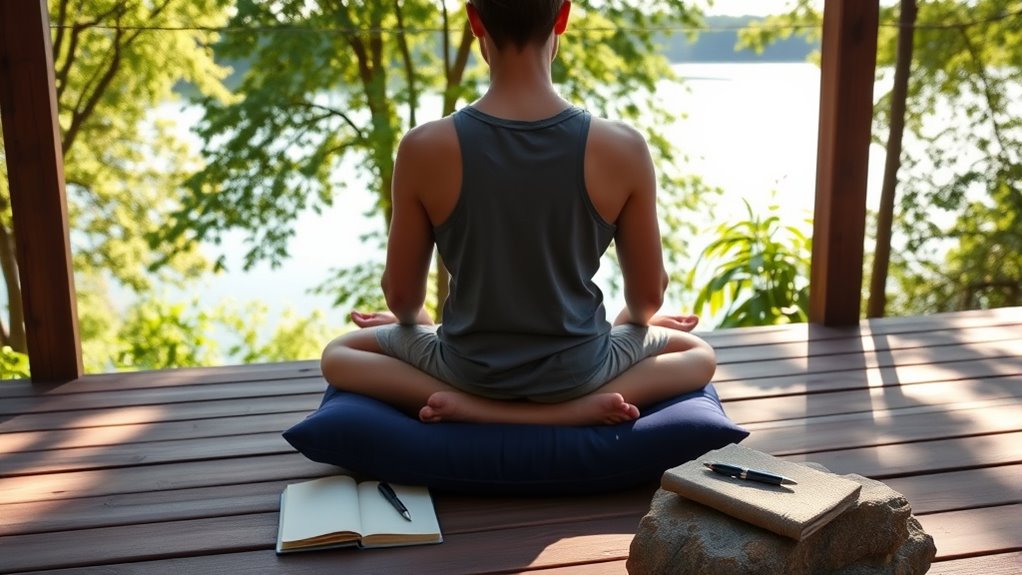To foster personal growth, try incorporating simple introspection techniques like mindfulness and journaling. Focus on daily breath awareness or gentle meditation to stay present and observe your thoughts without judgment. Use journaling as a private space to reflect on your feelings, patterns, and progress over time. Combining these practices helps you build self-awareness, recognize emotional triggers, and embrace ongoing growth. Keep exploring these techniques to unearth deeper insights about yourself and your journey ahead.
Key Takeaways
- Practice daily mindfulness exercises to increase self-awareness and observe emotional responses non-judgmentally.
- Use journaling to reflect on thoughts, feelings, and recurring patterns for deeper internal insights.
- Combine mindfulness and journaling to create a feedback loop that enhances personal understanding and growth.
- Identify triggers and motivations by regularly exploring inner experiences through reflective writing.
- Emphasize patience and consistency, viewing self-awareness as an ongoing, evolving journey for continuous development.

Have you ever wondered how to better understand yourself and foster personal growth? The journey inward can be both rewarding and transformative, but it requires intentional effort. One effective way to start is by incorporating mindfulness exercises into your daily routine. These practices help you become more aware of your thoughts, feelings, and bodily sensations without judgment. For example, taking a few minutes each day to focus on your breath can anchor you in the present moment, reducing stress and increasing clarity. As you develop this habit, you’ll notice a deeper understanding of your emotional responses and patterns, which is essential for growth. Mindfulness exercises also encourage patience and compassion toward yourself, allowing you to observe your inner world with curiosity rather than criticism. Pairing these exercises with journaling practices can amplify their benefits. Journaling provides a dedicated space to process your thoughts, reflect on experiences, and identify recurring themes or triggers. When you write regularly, you create a record of your inner journey, making it easier to spot progress and areas needing attention. For instance, after a mindfulness session, jotting down what you noticed can deepen your insights and reinforce positive habits. Over time, your journal becomes a mirror reflecting your evolving self-awareness. It’s important to approach journaling with honesty and openness, allowing yourself to explore both successes and struggles. Don’t worry about spelling or grammar—focus on expressing what’s truly in your mind and heart. This honest reflection can illuminate patterns you might not see otherwise, revealing insights that guide your personal growth. Incorporating self-awareness into your routine can also help you better understand how your environment and habits influence your mindset. Combining mindfulness exercises with journaling practices creates a powerful feedback loop: mindfulness sharpens your awareness, and journaling helps you process and remember what you discover. Together, they foster a non-judgmental attitude toward yourself, making it easier to accept your flaws and celebrate your progress. As you consistently practice these techniques, you’ll find that understanding your motivations, fears, and desires becomes more natural. This self-awareness translates into better decision-making, healthier relationships, and a more authentic life. Remember, growth isn’t about perfection or rushing through the process; it’s about showing up with curiosity and patience. Incorporate these simple yet effective techniques into your routine, and over time, you’ll develop a richer, more compassionate understanding of yourself. Personal growth is a continuous journey, and with mindfulness exercises and journaling practices, you’re giving yourself the tools to navigate it with confidence and clarity.
Frequently Asked Questions
How Often Should I Practice Introspection Techniques?
You should practice introspection techniques regularly, ideally daily or a few times a week, to maintain consistency and see meaningful progress. The key is to keep a steady routine, so it becomes part of your lifestyle. Consistency helps you stay aware of your thoughts and emotions, making personal growth more effective. Adjust the frequency based on your schedule and comfort, but aim for regularity to maximize the benefits.
Can Introspection Lead to Overthinking or Self-Criticism?
Yes, introspection can lead to overthinking or self-criticism if you’re not careful. It can cause self-awareness pitfalls, making you dwell excessively on mistakes or doubts. This over-analysis might lead to emotional exhaustion, draining your mental energy. To avoid this, set boundaries for introspection, focus on solutions rather than problems, and practice self-compassion—reminding yourself that growth includes patience and understanding.
Are There Specific Techniques Suitable for Beginners?
Yes, as a beginner, guided journaling and mindfulness meditation are great techniques for you. Guided journaling helps you explore your thoughts with prompts, making self-reflection easier. Mindfulness meditation encourages you to focus on the present moment, reducing overthinking. Both are simple to start, don’t require much experience, and can build your confidence in understanding yourself better. Give them a try to develop your introspection skills gradually.
How Do I Stay Motivated to Continue Introspection?
You stay motivated by making mindfulness practices part of your daily routine, which keeps you engaged and present. Focus on developing emotional awareness, noticing your feelings without judgment. Celebrate small progress, like understanding a new emotion or gaining insight. Remind yourself why introspection matters—personal growth and clarity. Connecting with your goals helps maintain momentum, so set achievable targets and reflect regularly to see your progress, keeping motivation alive.
What Are Signs of Progress in Personal Growth Through Introspection?
You’ll notice signs of progress in your self-awareness development and emotional insight, like better understanding your reactions and feeling more in control of your emotions. Even small changes, like recognizing patterns or expressing yourself more honestly, indicate growth. Don’t overlook subtle shifts—these reveal you’re becoming more attuned to yourself. Progress isn’t always dramatic, but consistent reflection helps you see how far you’ve come on your journey.
Conclusion
By regularly practicing these introspection techniques, you’re paving the way for genuine personal growth. Remember, you’re the captain of your own ship, and self-awareness is your compass. Stay honest with yourself, embrace the journey, and don’t be afraid to face the tough truths. When you do, you’ll find that progress is more within reach than you think. Keep at it, and you’ll see that the more you look inward, the clearer your path becomes.









